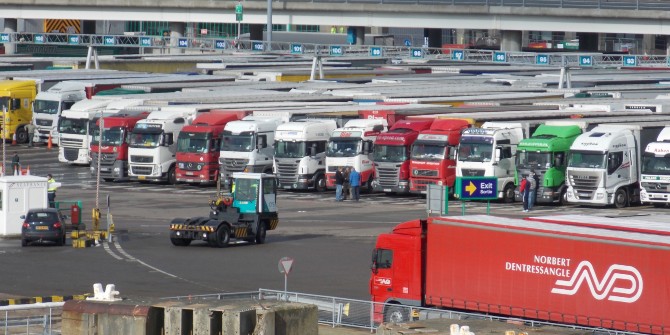Businesses now have a better idea of what exporting and importing goods from the EU will be like, write Ros Taylor and Roch Dunin-Wąsowicz (LSE) – and they don’t like it much.
Suddenly, it’s all about the customs declarations. UK firms face substantial costs — exceeding £13 billion in customs fees alone, according to Bloomberg. Four years of uncertainty about what Brexit means for UK-EU trade are coming to an end as bulldozers move into Kent.
“Contractors moved in on the 27-acre spot close to Junction 10a of the M20 today as ministers prepare for the end of the transition period in December,” reported Kent Online. Locals were annoyed that the first they heard of it was through the press. The site will function as both a customs clearance centre and a lorry park. It is just the first of 10-12 planned customs facilities, five of them in Kent.

The government has now published a 260-page document, The Border with the European Union: Importing and Exporting Goods, which explains that full customs declarations will be needed from July 2021. Products of animal origin require checks and pre-notification from April. “About half the food consumed in the UK is imported, with four-fifths of food imported from the EU alone,” notes the FT. “The Food and Drink Federation warned the lists of different processes set out in the document would be ‘bewildering’ for many operators. The lack of customs agents is the single biggest cause for concern.”
At some point I hope that there will be some recognition that all of the people who said that leaving the EU would mean additional cost and bureaucracy for businesses were right and those who spent the past years peddling fantastical solutions that don’t exist were not.
— Sam Lowe (@SamuelMarcLowe) July 13, 2020
A mobile app designed to ease the process will begin testing in November. Comparisons have inevitably been made with the NHS Test and Trace app.
The document doesn’t cover the Northern Ireland Protocol, which will be covered in a later publication. The Northern Ireland Affairs Committee questioned this week whether the unfettered trade promised by the PM would be possible, given the need for an exit summary declaration. This was the ‘piece of paper’ the PM said NI businesses could throw in the bin.
Meanwhile, details of the UK’s new fast-track immigration scheme have been announced by the Home Office – and it still excludes care workers, despite a shortfall of around 120,000 posts. A spokesman said: “We want employers to invest more in training and development for care workers in this country.”
Scotland and Wales will lose their devolved powers over state aid under a bill expected this autumn.
Make no mistake, this would be a full scale assault on devolution – a blatant move to erode the powers of the Scottish Parliament in key areas. If the Tories want to further boost support for independence, this is the way to do it. https://t.co/Gt2b3W7X05
— Nicola Sturgeon (@NicolaSturgeon) July 13, 2020
On LSE Brexit
What would Joe Biden’s election mean for the North Atlantic Trade Triangle? Experts gathered on Zoom through the LSE to discuss the future of UK-EU-US trade.
LSE Continental Breakfast 17: The North Atlantic Trade Triangle
“The rise of anti-system politics reflects the exhaustion of neoliberal democracy: an economic model that ultimately only worked for a minority, and a political system that closed off alternatives to it,” writes the LSE’s Jonathan Hopkin.
The rise of anti-system politics reflects the exhaustion of neoliberal democracy
Finally…
A reminder that anyone who wants to go to a business meeting or conference in the EU after 1 January will have to meet that country’s requirements in order to do so. In some cases you can already start applying for a visa.







“Meanwhile, details of the UK’s new fast-track immigration scheme have been announced by the Home Office – and it still excludes care workers”
Sadly, we are expecting many people in this country to be looking for work soon. There is no need to fill care worker vacancies with people from other countries.
Keynes told us that in a recession the government should employ people to dig hole and fill them in again in order to create employment. We instead can employ people to manage the new customs regulations. Where we were anticipating that this would detract from our national effort, we now find that it will contribute to it.
such a short term view it clearly show that the people who write posts like this have never lived in real world situations.
1) lorry parks with container scanners, customs, loading areas. = money in and jobs, smuggling contained- people, drugs, contraband.
2) road tax on foreign vehicles (like switzerland does for transporting on their roads for upkeep)= cash in.
3) VOSA inspections so rough old non roadworthy vehicles are controlled uk side ( safety and income)
4) petrol stations- so aforementioned eastern European trucks running tax free red diesel in long range tanks are held to account
5) service station with shops and restaurants ( commerce and jobs)
_-better than an old field.
It appears that many of the areas with the strongest pro-Brexit voting patterns in the South East may be rewarded with having to support the highest levels of environmental damage from road traffic!.
You have confused cause and effect here. Kent has been one huge lorry park since long before the referendum and this contributed to the pro-Brexit sentiment.
I feel sorry for those nearest the new facility but for the rest of Kent, if it means less lorries parking overnight in laybys, on verges and in front of people’s homes then that must be a good thing. Particularly so, if the new facility provides lorry drivers with a proper amenity to dispose of their rubbish responsibly.
Additional parking facilities may indeed be welcome and there is a direct causal relationship between the size of these and the time/numbers of vehicles that are ‘backed’ up because of the complications of documentation arising from Brexit regulations. But the environmental issue of increased nitric emissions affecting both East Sussex and Kent, directly attributable to the consequences of erratic HGV flows, as a consequence of Brexit, is a major public health issue. Even if cross-channel traffic flows are associated with Brexit popularity (would hesitate to call it a causal relationship), the time factor that heavy traffic will occupy geographical in order to satisfy Brexit-generated administration will lead to environmental degredation
Don’t worry. The lorries shut their engines when parked up, and, at any rate, there will be far fewer crossing the channel as more will be produced in-house and more will be sourced from destinations served by container ships.
It will take some time to build up a new set of trading relationships and all fresh produce is likely to follow traditinal routes